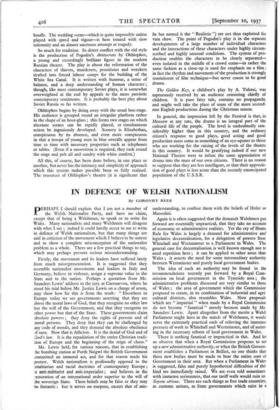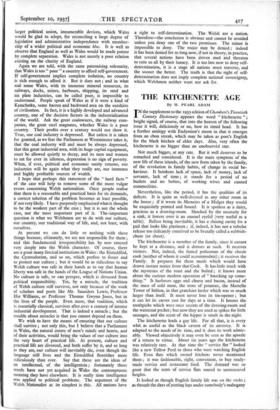IN DEFENCE OF WELSH NATIONALISM
By GORONWY REES
PERHAPS I should explain that I am not a member of the Welsh Nationalist Party, and have no claim, except that of being a Welshman, to speak or to write for Wales. Many nationalists and many Welshmen will disagree with what I say ; indeed it could hardly occur to me to write in defence of Welsh nationalism, but that many things are said in criticism of the movement which I believe to be untrue and to show a complete misconception of the nationalist problem as a whole. There are a few practical things to say, which may perhaps prevent serious misunderstanding.
Firstly, the movement and its leaders have suffered lately from much misrepresentation. It is suggested that they resemble nationalist movements and leaders in Italy and Germany, believe in violence, assign a supreme value to the State and to the nation. Perhaps a quotation from Mr. Saunders Lewis' address to the jury at Caernarvon, where he stood his trial before Mr. Justice Lewis on a charge of arson, may show how far this is from the truth: "Elsewhere in Europe today we see governments asserting that they are above the moral laws of God, that they recognise no other law but the will of the Government, and that they recognise no ather power but that of the State. These governments claim absolute powers ; they deny the rights of persons and of moral persons. They deny that they can be challenged by any code of morals, and they demand the absolute obedience af men. Now that is Atheism. It is the denial of God and of God's law. It is the repudiation of the entire Christian tradi- tion of Europe and the beginning. of the reign of chaos."
Mr. Lewis held, for various reasons, that in establishing he bombing station at Porth Neigwl the British Government :committed an immoral act, and for that reason made his protest. Welsh nationalism is profoundly opposed to the totalitarian and racial doctrines of contemporary Europe ; is anti-militarist and anti-imperialist ; and believes in the :estoration of an international order superior to the will of the sovereign State. These beliefs may be false or they may .be fantastic : but it serves no purpose, except that of mis- understanding, to confuse them with the beliefs of Hitler or Mussolini.
Again it is often suggested that the demands Welshmen put forward are essentially unpractical, that they take no account of economic or administrative realities. Yet the cry of Home Rule for Wales is largely a demand for administrative and legislative decentralisation, for a delegation of powers from Whitehall and Westminster to a Parliament in Wales. The general case for decentralisation is well known enough not te need repetition here ; it can be applied to other areas than Wales ; it asserts the need for some intermediary authority between Westminster and purely local government bodies.
The idea of such an authority may be found in the recommendations recently put forward by a Royal Com- mission on local government in the Tyneside area ; the administrative problems discussed are very similar to those of Wales ; the area of government which the Commissior proposed to create, in its combination of industrial and agri- cultural districts, also resembles Wales. Now proposals which are " impartial " when made by a Royal Commission do not become " fanatical " merely because made by Mr. Saunders Lewis. Apart altogether from the merits a Welsh Parliament might have in the minds of Welshmen, it woulc serve the extremely practical ends of relieving the immense pressure of work in Whitehall and Westminster, and of assist- ing in the necessary reform of local government in Wales.
There is nothing fanatical or impractical in this. And let us observe that when a Royal Commission proposes to set up a new administrative authority, or when the British Govern- ment establishes a Parliament in Belfast, no one thinks that these new bodies must be made to bear the entire cost of Government in their area. But when a Parliament in Wales is suggested, false and purely hypothetical difficulties of this kind are immediately raised. We are even told sometimes with immense seriousness, that our tariff walls would ruin us. Soyons serieux. There are such things as free trade countries, as customs unions, as State governments which exist in a larger political union, innumerable devices, which Wales would be glad to adopt, for reconciling a large degree of legislative and administrative independence with member- ship of a wider political and economic bloc. It is well to observe that England as well as Wales would be made poorer by complete separation. Wales is not merely a poor relation existing on the charity of England.
Again we are told, with the same patronising solemnity, that Wales is too" poor "a country to afford self-government. If self-government implies complete isolation, no country is rich enough to afford it. But it does not ; and in what real sense Wales, with its immense mineral resources, its railways, docks, mines, harbours, shipping, its steel and tin plate industries, can be called poor, is impossible to understand People speak of Wales as if it were a kind of Kamchatka, some barren and backward area on the outskirts of civilisation. In fact, it is a highly developed and advanced country, one of the decisive factors in the industrialisation of the world. Ask the great coalowners, the railway com- panies, the great steel magnates, whether Wales is a poor country. Their profits over a century would not show it. True, our coal industry is depressed. But unless it is taken for granted, as we fear the Parliament at Westminster takes it, that the coal industry will and must be always depressed, that this great industrial area, with its huge capital equipment, must be allowed quietly to decay, and its men and women to rot for ever in idleness, depression is no sign of poverty. When, if ever, political and economic sanity returns, our industries will be again what they really are, our immense and highly profitable sources of wealth.
I hope that perhaps this statement of the "hard facts " of the case will help to remove some of the more vulgar errors concerning Welsh nationalism. Once people realise that there is a reasonable and practical basis for its demands, a correct solution of the problem becomes at least possible, if not very likely. I have purposely emphasised what is thought to be the weakest part of the case ; but it is not the whole case, nor the most important part of it. The-important question is what we Welshmen are to do with our culture, our country, our traditional way of life, and, not least, with ourselves.
At present we can do little or nothing with these things because, ultimately, we are not responsible for them ; and this fundamental irresponsibility has by now entered very deeply into the Welsh character. Of course, there are a great many farcical institutions in Wales : the Eisteddfod, the Cymrodorion, and so on, which profess to foster and to protect our culture ; but it would be as ridiculous to say Welsh culture was safe in their hands as to say that human liberty was safe in the hands of the League of Nations Union. No culture is safe, or can prosper, which is divorced from political responsibility. Yet, by a miracle, the tradition of Welsh culture still survives, not only because of the work of scholars and poets like Mr. Saunders Lewis, Professor Ifor Williams, or Professor Thomas Gwynn Jones, but in the lives of the people. Even more, that tradition, which is essentially classical, survives after over a century of intense industrial development. That is indeed a miracle ; but the trouble about miracles is that you cannot depend on them.
We wish to have the means of ensuring that our culture shall survive ; not only this, but I believe that a Parliament in Wales, the natural centre of men's minds and hearts, and of their activities, would bring the values of our culture into the very heart of practical life. At present, culture and practical life are divorced, and both suffer by it, and so long as they are, our culture will inevitably die, even though the language still lives and the Eisteddfod flourishes more ridiculously than ever. Say that these are the ideas of an intellectual, of the intelligentsia ; fortunately those words have not yet acquired in Wales the contemptuous meaning they have elsewhere. It is really time intelligence was applied to political problems. The argument of the Welsh Nationalist at its simplest is this. All nations have a right to self-determination. The Welsh are a nation. Therefore—the conclusion is obvious and cannot be avoided unless you deny one of the two prernisses. The minor is impossible to deny. The major may be denied ; indeed it has been denied for so long now, if not in theory, in practice, that several nations have been driven mad and threaten to ruin us all by their lunacy. It is too late now to deny self- determination, it is a stage all nations must traverse, and the sooner the better. The truth is that the right of self- determination does not imply complete national sovereignty, which Welshmen neither want nor ask for.











































 Previous page
Previous page